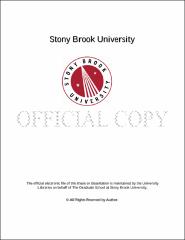| dc.identifier.uri | http://hdl.handle.net/11401/77744 | |
| dc.description.sponsorship | This work is sponsored by the Stony Brook University Graduate School in compliance with the requirements for completion of degree. | en_US |
| dc.format | Monograph | |
| dc.format.medium | Electronic Resource | en_US |
| dc.language.iso | en_US | |
| dc.publisher | The Graduate School, Stony Brook University: Stony Brook, NY. | |
| dc.type | Dissertation | |
| dcterms.abstract | This dissertation supports a view of Russian as a QR language of the English variety, together with the general nuanced picture of Bobaljik and Wurmbrand (2012), wherein there is no “QR parameter†sorting languages as scope frozen vs. scope fluid; rather, scope freezing is a property of constructions. Russian, I argue, shows the same contexts of scope fluidity as those in English, but also exhibits a previously unnoticed wide range of contexts where scope is indeed frozen. I propose a theory of scope freezing that relies on a key empirical generalization drawn from the data: SF Generalization: Scope freezing results when one QP raises over another to a c-commanding position as a result of a single instance of movement. The one thing unifying all scopally frozen cases in Russian, I argue, is the presence of overt raising of a structurally lower QP across a higher one. Scope freezing itself I analyze in terms of a Relation ℜ, established directly between the two QPs as the result of this overt raising operation. Thus unlike previous theories of scope freezing, my account proposes that in scope freezing cases there exists a special relation between the two QPs themselves, similar to that existing between the two QPs in an inversely linked structure, or a binding relation. I propose a possible formalization in the spirit of Stanley and Szabó (2000) and Stanley (2002) whereby nominal restriction of the lower QP is associated with a domain variable bound by the higher QP. This binding relation established due to overt crossing of QPs is what precludes the now structurally lower QP1 to raise past QP2, thus accounting for the relative nature of scope in scope freezing contexts. The SF Generalization, which is shown to be very robust, has important consequences for the Russian VP-internal argument structure debate: it suggests that Russian ditransitives are not a homogeneous group, with one argument always projected higher than the other; instead, they are subdivided into distinct classes. The detailed picture of Russian scope and scope freezing discussed in the thesis has important implications for cross-linguistic investigation of quantifier scope. It suggests that other languages may also have been misclassified into the “scopally-frozen†class. | |
| dcterms.available | 2017-09-20T16:53:29Z | |
| dcterms.contributor | Larson, Richard K | en_US |
| dcterms.contributor | Yun, Jiwon | en_US |
| dcterms.contributor | Bailyn, John F | en_US |
| dcterms.contributor | Johnson, Kyle | en_US |
| dcterms.contributor | Fox, Danny | en_US |
| dcterms.contributor | Champollion, Lucas. | en_US |
| dcterms.creator | Antonyuk, Svitlana | |
| dcterms.dateAccepted | 2017-09-20T16:53:29Z | |
| dcterms.dateSubmitted | 2017-09-20T16:53:29Z | |
| dcterms.description | Department of Linguistics. | en_US |
| dcterms.extent | 269 pg. | en_US |
| dcterms.format | Application/PDF | en_US |
| dcterms.format | Monograph | |
| dcterms.identifier | http://hdl.handle.net/11401/77744 | |
| dcterms.issued | 2015-05-01 | |
| dcterms.language | en_US | |
| dcterms.provenance | Made available in DSpace on 2017-09-20T16:53:29Z (GMT). No. of bitstreams: 1
Antonyuk_grad.sunysb_0771E_12526.pdf: 2217195 bytes, checksum: 94f1d1d2cd4d5d905e1a4c7f4bbff670 (MD5)
Previous issue date: 2015 | en |
| dcterms.publisher | The Graduate School, Stony Brook University: Stony Brook, NY. | |
| dcterms.subject | Linguistics | |
| dcterms.subject | quantifier scope, Russian, scope freezing, scrambling, syntax-semantics interface | |
| dcterms.title | Quantifier Scope and Scope Freezing in Russian | |
| dcterms.type | Dissertation | |

